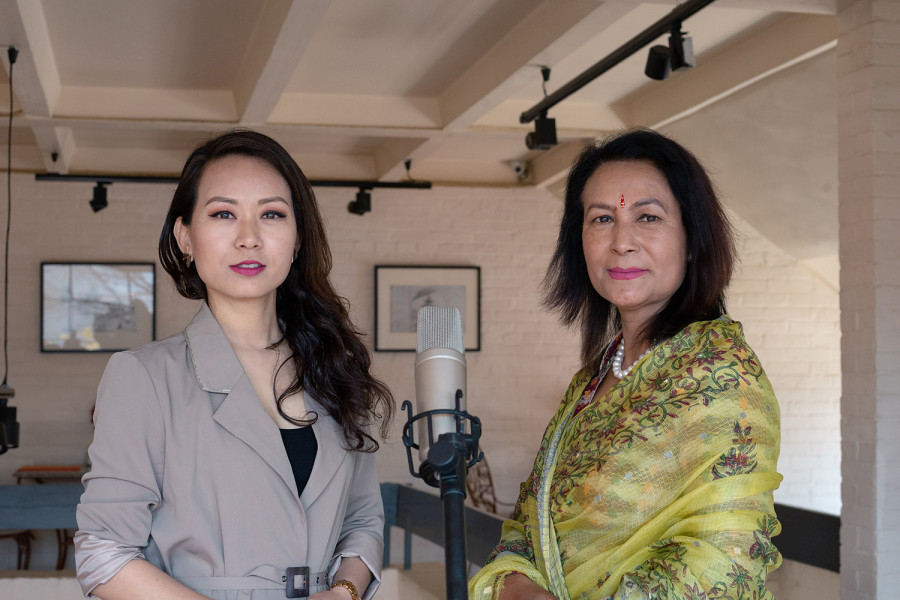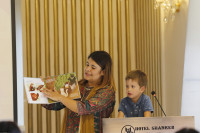Weekender
A tale of two singers
Two singers, one who’s reached the pinnacle of success with over four decades in the music industry and the other who’s tracing her predecessor’s footsteps toward success sit down with the Post for a conversation.
Prashanna Ghimire
Singers transform the air we breathe into music—a specific emotional medium reflecting their deepest essence, unique quality, and distinctive capacity all the while creating music that their listeners can connect to. A song is as good as its lyrics and rhythm, but to do justice to the composition, a singer must carry a tune and then some more.
Good singers in Nepal are in their hundreds, but there are only a dozen or so who are exceptional. The Post hit the jackpot with the legendary Kunti Moktan and one of the newest kids on the block, Trishna Gurung. They talk about the similarities and differences to become a singer worth her salt a couple of decades back and now.
Most Nepalis are familiar with Kunti Moktan’s songs with some dancing to her tunes even to this day. Trishna Gurung, on the other hand, has just begun her journey but already winning accolades for her combination of folk and soft rock. What’s similar between the two is foremost their love for their craft and then comes their ability to enthrall their listeners. Kunti has over the years performed live in over 20 countries, Trishna has 23 million views on her cover of the song ‘maya pirati’ on YouTube and does regular live shows across the country and in Australia.
Kunti, in her late 50s now, is a trained singer, who recorded her first song when she was 14. She recalls her first song recording experience, and says, “It was at All India Radio’s studio in Kurseong, Darjeeling, in 1980. I had one take to record each song and had to record five songs in a day,” she says. Trishna at 25 years of age, is a self-taught singer, recorded her first song when she was 13. She says, “The first song I recorded was a slow rock song—‘daiba janos’—at a studio in Putalisadak. It was a duet with Basan Shrestha, the vocalist of the 11:30 Basan.”
Kunti learned music under the guidance of her guru JC Rai, who taught her for six years before she completed her Bachelor’s Degree in Music from Allahabad, India. Trishna, on the contrary, is self-trained and took a few classes after she released her second song ‘khani ho yamu’. “I took a basic vocal lesson for a few months. I was more focussed on studying and put education on high priority, which is why I didn’t get the opportunity to take vocal classes early on,” she says.
Kunti believes that it’s never too late to create an opportunity for oneself to learn but one has to be determined to persevere. “I believe if you are really passionate to learn something you will find a way to do so. I used to walk three to four hours every day to my teacher’s house and there were other students who did the same. Of course, nowadays you can find music schools in every alley, but people have financial obligations and time issues. I feel instead of looking for easy availability one should strongly look at the determination to learn. You can learn at any age if you have the passion to pursue, I am still learning,” she says.
Both the singers are first-generation musicians in their families which meant that pursuing music came with its own set of challenges. “Back in the day, women in our society were not really encouraged to follow our passion, especially the arts,” says Kunti. “Hurdles came my way too which I overcame. But when I look back, I feel if I had the support of my family, my journey would have been a little less difficult.”
For Trishna, support came in the form of her mother. “When I said I wanted to play music my father was a little hesitant but my mother supported my dream right from the beginning,” she says. Being a parent herself, Moktan says she understands Trishna’s father’s inhibitions about his daughter pursuing music. “As a parent, you always wish the best for your children. I guess our parents were also in their own ways thinking about our good and they didn’t see much “good” in us pursuing music.” However, despite restrictions, Kunti continued to perform and after a while her parents just let her be. “There are always good and the bad; that’s the way of the world. It stands true in one’s career choices too. My parents just wanted me to marry a good man and have a comfortable life,” she says. “Which I eventually did. I met Shila Bahadur Moktan, who understood me and my music. He became the family that supported me.”
Women in Nepal have been facing the same challenges, more or less, over the decades. There have been discussions and discourses about a woman’s rightful place in the Nepali society and Kunti lived the change which began way before her time but whose impact is slowly being felt in young women like Trishna. “The challenges that I face as a female artiste in Nepal and what my predecessors faced may be the same. But, yes, there has been a shift in attitude, at least in my life as a woman,” says Trishna.
But what was it like to be a singer, regardless of gender, a couple of decades back? Kunti says, “Back in the day, performers just couldn’t afford to mess up the lines while singing. We had to get it right, whether that be our first time or the nth number of time we were performing the same song. But fast-forward to today, if a singer goofs up, the audience sings along.”
Kunti says that the reach is bigger today. The number of listeners runs in the millions. “We don’t even need studios to record songs today, we can do it on our phones and upload it online. It’s a good change in that singers can focus on singing rather than arranging the logistics to record their songs.”
On a lighter note, the ladies are asked to pick a favourite among their originals. For Trishna, it’s ‘gaine dai’. “One fine afternoon, I heard a street musician playing his sarangi. His music was so inspiring, I ended up writing a song about it,” she says. For Kunti, it is her popular song ‘mathi mathi sailunge ma’ without a doubt for it’s a song that was a milestone in her journey as a singer.
Kunti, an inspiration for young female vocalists in Nepal, who has been defining Nepali music for the past four decades, calls herself a work in progress. “I’m working on new songs. I’m playing with my thoughts and music and trying to create songs that Nepali women all over can relate to,” she says. For Trishna, this is just the start of her long journey as a singer. “I’m a learner. I have much to do before I can rest on my laurels. I’m also working on new music. Let’s see how that turns out.”




 9.75°C Kathmandu
9.75°C Kathmandu










